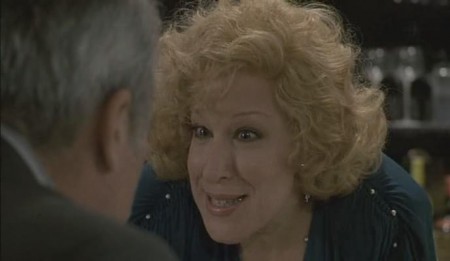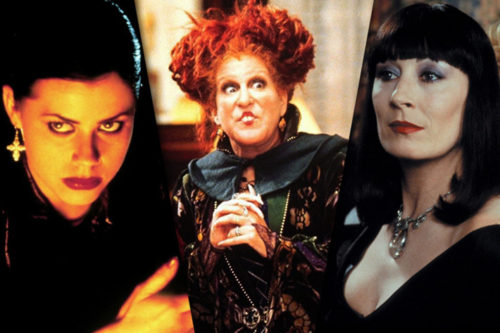New York Times
Down and Out in Beverly Hills (1986)
THE SCREEN: BEVERLY HILLS GOTHIC
By JANET MASLIN
Published: January 31, 1986
THE house is peach-colored, inside and out, and it has everything: potted trees big enough for a rain forest, a burglar alarm system that summons a veritable SWAT team, even his-and-hers pastel refrigerators in the peach-colored boudoir. On the wall hangs an expensive and flattering portrait of the owners, who look a good deal worse in the bed below. In fact, David (Richard Dreyfuss) and Barbara (Bette Midler) Whiteman are only nominally the heads of this household. They don’t run it, it runs them. And everyone within their domain -sexually confused son (Evan Richards), anorectic daughter (Tracy Nelson), sultry maid (Elizabeth Pena) – is showing signs of strain. Life here isn’t easy, not even for the family dog.
The classic Talking Heads song ”Once in a Lifetime,” which opens Paul Mazursky‘s ”Down and Out in Beverly Hills,” wasn’t written for the film, but it might as well have been: ”You may find yourself/In a beautiful house/With a beautiful wife/ You may ask yourself – Well?/How did I get here?” Mr. Mazursky has found, in precisely the kind of alienation that the song describes, the makings of a California comedy that is generous and scathing in equal measure.
The Whitemans, who are among the best-realized of Mr. Mazursky’s comic subjects, are viewed simultaneously with both contempt and compassion, but either way, they are seen at very close range. It is Mr. Mazursky’s particular gift to become part of the very thing he satirizes – he appears in this film as the most ridiculous of the Whitemans’ friends -without sacrificing anything of his sardonic perspective.
”Down and Out in Beverly Hills,” which opens today at the Ziegfeld and other theaters, takes its inspiration from Jean Renoir‘s ”Boudu Saved From Drowning,” which was based on a play by Rene Fauchois and told of a prosperous Parisian bookseller who rescues a suicidal bum from the Seine. The bum’s very surliness and ingratitude become the means by which the bookseller’s household is irrevocably transformed. What undoubtedly appealed to Mr. Mazursky here, aside from the thought of a latter-day vagabond trying to drown himself in a Beverly Hills swimming pool, was the instant and intuitive rapport between the bookseller and the man he rescues. Mr. Renoir’s bookseller and Mr. Mazursky’s Dave Whiteman both seem victims of their own good fortune, and are unexpectedly tantalized by the sudden daydream of throwing it all away.
Like Michel Simon’s Boudu in the original film, Nick Nolte’s Jerry Baskin is initially seen wandering through an affluent area, frightening the locals. When he loses his last friend, a mangy dog, he passes the point of no return. The filthy, bedraggled Jerry sneaks into the Whitemans’ manicured backyard, puts some rocks in his pocket and prepares to drown himself in the chlorinated depths of their swimming pool, just as Dave happens to be looking out the window. ”Barbara,” Dave asks in some confusion, ”is that the new pool man?”
But Dave saves Jerry, appropriately enough, since salvation is something of a fixture in the Whiteman household; the family already has a psychiatrist for its dog and a yogi who comes to Thanksgiving dinner and is teaching the Whitemans to walk on hot coals. Jerry, like Boudu, isn’t the least bit appreciative, but he is a quick study; in no time, he has figured out what each of the Whitemans would most like to hear. So Dave, for instance, is treated to the story of how Jerry became a derelict after being jilted by a beautiful woman in his acting class, a woman whom we all know. It was, Jerry explains, ”Linda Evans, between ‘The Big Valley’ and ‘Dynasty’ – you know, in that period.”
No film of Mr. Mazursky’s is without its occasional sentimental excess, and this one even has its silly side; certainly Mr. Mazursky, who wrote the film with Leon Capetanos, knows better than to throw everyone into the pool at the end of a party scene. But as a comedy of manners it has a dependably keen aim, with its most wicked barbs leavened by Mr. Mazursky’s obvious fondness for his characters. Mr. Dreyfuss, who displays a new maturity and self-possession in this role, captures both the silliness and the poignancy of Dave Whiteman, and he works very effectively with Miss Midler, who is bold enough to make Barbara thoroughly unpleasant in a lifelike way. Mr. Nolte, whose character is more of a cipher, has just the right intrusive and adaptable presence here, and his influence more than makes itself felt. In the supporting cast, Miss Nelson is tremendously poised as the Whitemans’ daughter, and Little Richard just right as their wild-eyed neighbor. Mike, a border collie, does Oscar-caliber work as Matisse, the family dog.







